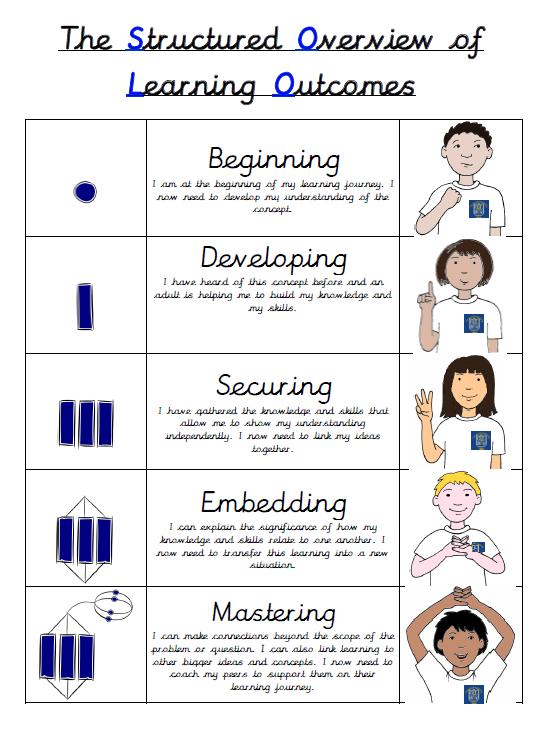Solo Taxonomy

At Our Lady of the Rosary, we use SOLO Taxonomy (Structure of Observed Learning Outcomes) as a whole-school framework for thinking, learning, and progression across the curriculum. Developed by Biggs and Collis (1982), SOLO provides a clear model for how learners deepen their understanding, from gathering simple information to connecting and applying complex ideas with independence.
SOLO helps pupils and teachers to see learning as a journey of increasing depth and complexity. It supports our belief that all children can grow as thinkers and problem-solvers, reflecting our Catholic vision of every child being uniquely created, valued, and capable of flourishing.
Our Progression Structure
Across the curriculum, pupils move through four key stages of understanding:
Developing: Pupils can recall facts or carry out simple skills but may need guidance to connect ideas.
Securing: Pupils begin to link ideas, explain reasoning, and apply their knowledge in familiar situations.
Embedding: Pupils show a deeper understanding, making meaningful connections across different contexts and subjects.
Mastery: Pupils think critically, evaluate ideas, and apply their learning creatively and independently in new and unfamiliar contexts.
These stages are used consistently across the school, helping children understand how they learn as well as what they learn. Visual prompts and learning walls in classrooms make this progression explicit so that children can identify where they are in their learning and what their next steps might be.
Across the Curriculum
At Our Lady of the Rosary SOLO Taxonomy is used to:
Guide lesson design: Teachers plan learning experiences that build from surface knowledge to deeper understanding.
Support adaptive teaching: SOLO provides a clear structure that enables teachers to adapt learning for every pupil—ensuring that all children are appropriately challenged and supported, including those working at greater depth.
Encourage metacognitive awareness: Pupils are encouraged to reflect on their thinking processes and take ownership of their progress.
Align assessment and feedback: Teachers and pupils use SOLO language in marking and discussions to describe the depth of understanding achieved.
Promote high expectations: SOLO supports our commitment to challenge every pupil, fostering perseverance, curiosity, and independence.
Impact on Learning
By using SOLO Taxonomy, pupils at Our Lady of the Rosary:
- Understand what quality learning looks like and can articulate their progress using shared language.
- Develop confidence to tackle challenging tasks, knowing that mistakes are part of deep learning.
- Become reflective learners who can connect knowledge across subjects and apply their understanding to real-world issues, including those explored through Catholic Social Teaching and our Caritas ‘Rooted in Love’ values.
- Are supported to move beyond recall towards critical thinking, creativity, and problem-solving.
A Shared Language for Growth
SOLO Taxonomy is embedded in our teaching, assessment, and professional development. It creates a shared language of learning, one that celebrates growth, reflection, and high aspirations for every child.
At Our Lady of the Rosary, SOLO Taxonomy helps our learners not just to know more, but to think more deeply, reflect more purposefully, and live out their learning with hope and compassion.



